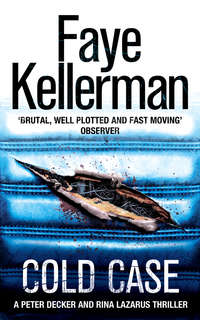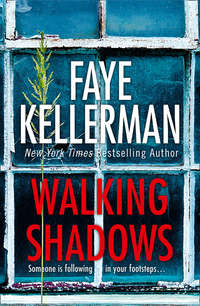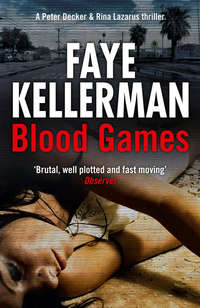
Полная версия
The Forgotten
The teen considered the words, but gave no indication that he agreed with them.
“You miss Sammy?” Decker asked.
“Yeah.” He licked his lips. “Yeah, I do. We E-mail each other almost every day, so in a way I talk to him as much as ever. But then things come up … things you don’t want to write about. It’s not the same.” He caught Decker’s eye. “Golding had a really nice girlfriend … Lisa Halloway. They were real tight, and then he broke up with her. She was upset about it. Totally baffled. At least, that’s what she told me. I felt bad for her. I almost asked her out. Not because I felt bad for her, but because I liked her. She was smart enough and really good-looking.”
“So why didn’t you ask her out?”
“What’s the point?”
“I’m sure she would have gone out with you, Jacob,” Decker said. “Besides the brains, you got your mother’s baby blues.”
“No, I didn’t mean that. I know she would have gone out with me. But it wouldn’t have lasted, so why make Eema upset? Eventually, I would have been too Jewish for her, and she would have been too goyish for me.”
He shrugged with resignation.
“You know, it’s not the rabbis and all the mantras they feed us at school that keeps me Orthodox. It’s idiots like Ernesto Golding. It makes me realize how alienated I am from the vast majority of this country. I can’t be a typical American teenager, starting with the fact that I’ve never eaten a cheeseburger. So maybe the rabbis did their job on some level.”
“Do you like being Jewish?”
Jacob turned hostile. “What kind of question is that? Do you like being Jewish?”
“Most of the time, yes. Can you stop biting my head off?”
“Sorry.” Jacob tapped his toe. “I’m okay with being Jewish. Better with it than I was six months ago. Now that the pressure’s off, and I can choose a secular college without feeling guilty, I feel a lot better about it.”
“That’s good.” Decker leaned down and kissed Jacob’s head. Not that he had to lean down much. The kid was inching his way to six feet. “I’ve got a mound of paperwork that’s weighing down my desk.”
“Go jam,” Jacob said. “Don’t worry about anything. Hannah will be fine.”
“And you?”
“I’m fine.” A pause. “A bunch of us are thinking of going to Magic Mountain Saturday night. I’m driving, but the guys are chipping in for the gas. I have enough for admission, but that’ll bust me. Do you have any odd jobs I can do for a couple of bucks?”
“I suppose baby-sitting counts for something.” Decker handed him a twenty. “That should tide you over for a while.”
“This is very generous.” A big smile … a genuine smile. “Thanks a lot. I’d better go study. I’m pulling high B’s in Gemora and would like to keep it that way.”
“Absolutely.” Decker left the boy in peace. Money. It certainly wasn’t love, but sometimes it acted as a damn good imposter.

Microwaving the pizza had left it tasteless with soggy crust to boot, but it was hot and filling and that was the best that Decker had hoped for at this point in time and space. He made it back to the station house by six-thirty with a belly full of grease and a head spinning with ideas. He knew that Ernesto Golding had not worked alone, but other culprits continued to be elusive entities. Decker would have liked to question Ernesto’s friends extensively—find out if they had information—but he knew that their parents wouldn’t allow contact. Without proof of involvement, Decker couldn’t muscle his way into their living rooms, and no other evidence was forthcoming because Ernesto insisted he was the sole perpetrator. Furthermore, since Ernesto had cooperated with the D.A., Melrose had high hopes of getting the charges knocked down to a malicious mischief misdemeanor—probation combined with community service, and a sealed record.
Now that Ernesto had entered into the legal system, Decker’s part in the play had been relegated to the role of supporting cast. He didn’t have a lot of working time. If he didn’t come up with something new very soon, the entire case would slip from his grasp—officially closed, naming Ernesto Golding as the one and only vandal.
Entering the detectives’ squad room, Decker was heartened to find Martinez and Webster at their desks. Wanda Bontemps was also finishing up her paperwork. She was hunched over her desk, her fingers playing with a cap of tightly knit curls. She wore black pants and a blue turtleneck. A black blazer was draped across the back of her chair. He flagged her down, along with Martinez and Webster, and the quartet convened in Decker’s office.
Webster said, “Was Golding arraigned yet?”
“An hour ago,” Decker answered. “No contest. He’s back home—own recognizance. Court date will be in about six weeks.”
“Was he expelled from school?” Wanda asked.
“That I don’t know,” Decker said. “I have this gut feeling that there’ve been some quiet negotiations behind the scene. You know how it is with institutions and money.”
“The way of the world,” Webster said. “Nothing you can’t buy with money. Even money.”
Decker said, “I don’t know what the headmaster is planning to do. In a perfect world, Golding should be expelled.”
“In a perfect world, he should be in jail,” Wanda said.
“This is very true. But given the fact that Melrose pushed through a rush job, it’s unlikely.” Decker felt glum, as if he somehow had failed Rina. “What’d you find out about the Preservers of Ethnic Whatever.”
“It’s run by a guy named Darrell Holt, who is a mixture of lots of races,” Martinez said. “So I can’t figure out how he reconciles his own genetic variety with his ethnic purity crap. Anyway, he’s wrangled endorsements for his cause from some token minorities—one Filipino, one Hispanic, one African-American, one Asian, one Jew, and for sake of completion, one Anglo.”
“What kind of endorsements?” Decker asked.
“You can see for yourself, sir.” Webster handed him the flyers. “It’s all the same crud. Y’all can’t pin them down just by reading the articles. They play the separate but equal over and over and over.”
Decker thumbed through the pages, scanning the paragraphs. “Here’s one that recommends an English-only policy.”
“Yeah, that’s the one by the Marine.”
“Hank Tarpin.” Decker scanned the printed material. “Superficially, there’s lots here that my wife would agree with. She would kill her sons if they married outside the religion.”
“She isn’t the only one,” Wanda said. “I’d like my daughter to marry a good African-American man. Life is hard enough. At least in your own community, you can go around without getting stares and snickers. I talk from experience. About three months ago she had a Hispanic boyfriend.” She looked at Martinez. “People gave them looks.”
“What happened?” Martinez said.
“They broke up, but not because of the race … although I’m sure that didn’t help. He was a cop and she’s a cop and that wasn’t good.”
“One of my kids married an Anglo,” Martinez said. “The other married a nice kid whose family was originally from Cuba. I’m from Mexico, and that’s another ball of wax. I can’t say I feel more comfortable with one son-in-law over the other. But that’s not the case with my parents, who don’t speak English all that well. There’s a language barrier. Which is why, personally, I’m big on an English-only policy in school. If you don’t speak and write the language of the country, you’re second class. No way my kids and grandkids are going to be second-class citizens.”
“I agree with you, Bert,” Webster said, “but I reckon that you and the Marine are coming at it from different angles.”
“That’s true, but it’s irrelevant.” Decker put down the papers. “But the only pertinent question now is, do we have anything to link Holt to the vandalized synagogue?”
“Nope,” Martinez said. “But we talked to Holt before you arrested Golding. Maybe if we went back and mentioned Golding—”
“And then maybe Golding’s lawyer would be all over our asses for giving out the name of a minor,” Decker interrupted. “Pulling the Ernesto card is out. If the Preservers of Ethnic ‘Racists’ is involved, we’ve got to get them without asking about Golding.”
“How about harboring a fugitive?” Bontemps said. “Tell the loo what you told me about Ricky Moke.”
“Who’s Ricky Moke?” Decker asked.
Webster explained. “Supposedly Moke has been implicated in blowing up university animal laboratories. Supposedly Holt knows Moke. Supposedly Moke has dropped by their office. Supposedly Moke is an ardent racist.”
“That’s an awful lot of supposedly,” Decker said. “Does this bad guy have a sheet?”
“Nothing I could find,” Martinez said. “But I’ve only checked locally.”
“If he’s implicated with bombs, the FBI would have information on him. Make a couple of calls tomorrow.” Decker sat back. “What about Darrell Holt? Does he have a sheet?”
Webster shook his head.
“Any information on him?” Decker asked.
“The Preservers have a Web site,” Webster said. “But that’s all fluff.”
“Find out what you can about him.” Decker scanned through the leaflets. “Are these the only papers you found? I’m wondering if Golding ever wrote anything for them.”
“I’ll check it out tomorrow.”
Decker thought about what Golding had told him, about his German grandfather and his dubious past. “While you’re looking up people in the computer, find out what you can about Jill and Carter Golding. I want to know everything I can about Ernesto, and it doesn’t hurt to start with the parents. Since they’re well known, it should be easy to find information about them. Also do a search with Golding and Holt and/or Golding and Ricky Moke as a common subject and see if the computer throws out any association.”
Webster said, “The Preservers also have a girl working there. She looks about twelve.”
“Name?”
“Erin Kershan.”
“Look her up.”
Wanda said, “Should we put a watch on them, Lieutenant?”
Decker considered the idea. “Are they local?”
“Yes, they are,” Martinez told him. “Matter of fact, they live in the same building although different apartments. I’ll do it.”
“I’ll do it, Bert,” Webster volunteered. “I got the two A.M. feeding anyway.” He looked at Decker. “Could I leave at about one?”
“Sounds fine, Tom. You can put in for overtime.”
“I can use the money, sir. Thank you.”
Decker started writing down a schedule. “While you’re doing stakeout, I’ll drop by the Goldings and run Holt, Moke, and the Preservers of Ethnic Integrity by Ernesto. The boy isn’t going to admit to anything, but a good nuance is worth a thousand words.”
The Goldings weren’t home, leaving Decker to wonder if they were hiding out somewhere. Just as likely, they were out to dinner. It was only a little past eight. Decker called Jacob and was apprehensive when no one picked up the phone. He tried Jacob’s car phone. The boy answered after two rings. “Yo.”
“Are you two all right?”
“Oh, hi, Dad. We went out for ice cream.”
In the background, he heard Hannah scream, “Hi, Daddy!”
“Hi, Hannah Rosie.” To Jacob, Decker said, “Is she in the backseat?”
“Backseat with her seat belt on,” Jacob replied. “We’re on our way home.”
“I was thinking about stopping by the shul to see Eema.”
“That’s fine. Don’t worry about us. I can put Hannah to bed.”
“Could you do me another favor?”
“What?”
“Before you put her to bed, can you two come down and bring me some junk clothes and my sneakers from home in case I want to help paint later tonight.”
“No problem.”
“Or maybe I should just go home, so Hannah won’t be subjected to—”
But the line had already gone dead. He thought about calling Jacob back. He didn’t want Hannah reading all that hate-filled graffiti or seeing those dreadful pictures. Then again, Rina had been there for a while: the shul was probably somewhat sanitized by now.
He arrived at the shul by seven and parked on the street because the tiny lot was full. A few broken windows had been boarded up, but light shone through the translucent curtains covering the intact glass doors. When he went in, he entered a construction site. Tarps and drop cloths had been laid down everywhere. More than a dozen people were working, brushes and rollers in hand. The walls had been primed, and open paint cans were everywhere. Rina was wearing overalls and a big red bandana over her head. Her face was dotted with Navaho white. She gave him an air kiss.
“How’s it going?” Decker asked.
“Baruch Hashem!” She was smiling and it was genuine. “Let me introduce you to some of our volunteers that you don’t know.” She walked over to two African-American women. One was tall and skinny, the other was short and fat. Mutt and Jeff. “This is Letitia and this is Bernadette. They’re friends of Wanda Bontemps from her church. As soon as she called them, they came right down to help.” She patted Decker’s shoulder with a paint-splattered hand. “This is my husband, Peter.”
“Your husband.” It was the one named Bernadette. She had a smooth, round face and a stern look. She rocked from side to side. She was as tall as she was wide. “The police lieutenant.”
It sounded as if she was holding his title against him; in light of the past allegations of his department, that could very well be the case. He held out his hand to her and she took it.
Decker said, “Nice of you to help out.”
“It was nice of Wanda to call them down,” Rina said.
“Our church has an outreach program to help,” Bernadette said. “No one should be able to get away with defaming a house of God.”
“I agree,” Decker said.
“We need to start something like that in our community.” Rina turned to her new friends. “It’s not that we’re so provincial, although that’s part of it. It’s just that we’ve been so busy trying to make this congregation work. We barely have enough time and money to get our own services in order. But that’s going to change. We have to get more involved.”
“This was an eye-opener to me,” Letitia said. Her face was long and she had a wide, horsey smile. “I always thought the Jews had the big synagogues.”
“Some do,” Rina said. “We sure don’t. We’re lucky to pay the rent.”
“Yeah, I guess that’s my own prejudice talking,” Letitia said. “I’d better stop yakking and get back to painting.” She smiled again. “Go with my strengths.”
“How about some more coffee?” Rina asked. “I need more coffee.”
Decker was happy to see Rina so charged up and filled with action. It helped mitigate the pain of why she was there in the first place. He said, “The way you’re flitting around, do you think you really need more caffeine?”
“I don’t flit, I move in a purposeful manner,” Rina explained.
Bernadette said, “She just appears to be flitting because she’s so graceful.”
“Uh-huh,” Decker said. “Whatever you say, ma’am.”
Rina yelled out, “Moishe, we could use some fresh coffee.”
Moishe Miller—a big bear of a man—was standing in front of several folding tables piled high with shredded paper and abused books. At the moment, the bearded dentist was painstakingly piecing together torn bits from prayer books. “Reg or decaf?”
The women looked about the room, then at each other. “Full strength,” Rina ordered. To Decker, she said, “Are you going to help out? We took down all the bookshelves. We need someone to paint them and put them back up.”
“Yes, I’m going to help out. Jacob’s bringing over some junk clothes. I have a little more work to do, and then I’m all yours.”
“Good to have someone who knows what he’s doing. House painting is a lot harder than it looks. It’s not just slopping paint over the walls.”
“So you’ve discovered.”
“It actually takes some practice.”
“Does this mean you appreciate me more?”
“I’ve always admired your manual skills. You just don’t work fast enough.”
“But I do a good job. And the cost is cheap. You get what you pay for.”
Rina nodded, then smiled at the women. But the expression was a taut one.
Bernadette caught the tension. “Well, nice meeting you … Lieutenant.”
“Peter is fine,” Decker said.
“Peter then.” Again, Bernadette shook his hand, then nodded to Letitia. The two of them went back to their artwork. Rina used the moment to take Peter aside. She said, “Yonkie called me—”
“I can’t talk about it,” Decker said. “The party is a minor.”
“The party is a kid named Ernesto Golding,” Rina whispered. “You didn’t tell me, Yonkie did.”
“Do you know this kid?” Decker asked Rina.
“Never heard of him until Yonkie told me. There must be someone else involved. This isn’t the work of just one person.”
Decker shrugged.
“C’mon. Yes or no? Is there someone else?”
“No comment.”
“Now you’re sounding like a politician.”
“If you’re trying to get me angry, I’ve had worse insults.”
Rina grew impatient. “Peter, this is your shul, too.”
“I’m painfully aware of that, Rina.” Then he said, “Please tell me that you haven’t mentioned Golding’s name to anyone else.”
“Do I look like an idiot?”
Now she was glaring at him. He said, “Don’t we have enough on our minds without fighting?”
“This isn’t a fight,” Rina announced.
“It isn’t?”
“No. It isn’t. This is … both of us glaring at each other because we’re both under a lot of stress.”
“I’m glaring at you?” Decker asked.
“Yes, you’re glaring at me.”
“You’re glaring at me!”
“I know,” Rina said. “That’s why I said we were glaring at each other!”
Decker paused, then started laughing. It broke the strain, allowing Rina to laugh with him. She reached out and took his hand and squeezed it. “I’d hug you except I’d get paint all over your suit.”
“Hug me anyway.” Decker took her into his arms.
They hugged—a long and romantic one. And she did get paint on his suit. He didn’t care. That’s why God invented dry cleaning.

It was past eight and the Goldings still hadn’t made it home. Decker would try them in the morning. Still, he wasn’t ready to call it a working day. Six months ago, Ernesto Golding had a girlfriend named Lisa Halloway. Golding had mentioned her, and so had Yonkie. His stepson had stated that she had been devastated by the breakup. Decker wondered if she had picked up any telltale signs of Ernesto’s antisocial behavior before the actual vandalism.
The problem was getting past the parents. But that turned out to be the easy part: the parents weren’t home.
At least she didn’t slam the door in his face.
Under the illumination of a porch lamp, he noticed the winking of metal—multiple studs in her ears and a small stone in the side of her nose. Who knew what was in her belly button? Decker realized he shouldn’t judge by externals—if Yonkie had liked her, she must be a girl of some substance—but he was a middle-aged guy with old-guy prejudices. Trying to be objective, if he looked beyond the holes, he saw a pretty, dark-eyed girl with a clear complexion, an oval face, and dimples in the cheeks. Lots of long curls framed her face. She had her shoulders hunched over as if she was cold, and her arms were folded across her chest. She was unhappy and not afraid to express it.
“I don’t know anything about the vandalism.” Her voice was raspy and low. “But even if I did know anything about the vandalism, I wouldn’t rat on Ernesto.”
“All I want to do is talk for a few minutes,” Decker said.
“Why should I let you in? You could be a rapist!”
Decker smoothed his ginger mustache, aware of Lisa as an angry, young girl wearing a clingy, white tank top and jeans and no underclothes. He could see her nipples even in the poor light. Being alone with her—in private—was not a good idea. He said, “So we’ll talk out here.”
“For all the neighbors to see?”
“Yeah.” Decker smiled. “That’s the point. You’ll feel more comfortable that way.”
“You can come in,” Lisa sneered. “I don’t seriously believe you’re a rapist.”
“Thank you, but I’m fine out here.” Decker kept his face flat. “Can I talk to you on a conceptual level for a moment, Lisa? Let’s say we are given competing attributes—loyalty and justice. Both are admirable traits, agreed?”
“I don’t see the point of all this!” She rubbed her arms. “Also, I’m cold.”
“I’ll wait while you get a sweater.”
“Never mind!”
She was thoroughly sullen, but Decker continued anyway. “If the party in question is accused of doing something criminal, but there is no definitive guilt or innocence, maybe the party deserves the benefit of the doubt, ergo loyalty. But if you know for sure that he did it—because he himself has admitted it—doesn’t his criminal act abnegate his right to expect loyalty, and isn’t loyalty moot because he already admitted the act?”
She swished her curls. “I don’t know what you’re talking about.”
“Why be loyal when you know he did it?”
“Lieutenant Lazarus, it’s all moot. I don’t know anything about the vandalism. Can I go now?”
Lieutenant Lazarus—using Yonkie’s surname. “It’s Lieutenant Decker,” he corrected. “And it’s a free country. You can leave anytime you want.”
But she didn’t leave.
Decker said, “You went with Ernesto for a while, didn’t you?”
“You know I did. Otherwise, why would you talk to me? What’s the point?”
“Any of his friends twang your antenna?”
“You mean did he hang out with Brown Shirts?” She rolled her eyes. “And if he did, do you think he would have told me about it? I’m Jewish.” She gave a snort. “Not the right kind of Jewish for you.”
Decker’s eyes bored into hers. “What did you say?”
The intensity in his voice threw her off-balance. She blushed, then pressed her lips together and turned away, the implicit message being she blew it with her mouth. The other implicit message was that it probably hadn’t been the first time.
“Who have you been talking to, Lisa?” Decker pressed.
He knew damn well whom she’d been talking to. Now Decker had the advantage. She knew she had gotten Jacob in trouble. She’d have to call him and explain. But first she’d have to deal with Decker. If she remained snotty, she would add to Jacob’s woes.
Now she was scared, didn’t make eye contact. “Can I go now?”
Decker was relentless. “Have you been talking to my son?”
“Stepson—”
“I stand corrected. Where do you know him from?”
“Just around—”
“Where?”
“I met him at a party. What’s the big deal? Jesus! Now I know why—” Again she stopped herself.
“Go on!”
Lisa rubbed her hands together. “Look! I met Jake at a party. Ernesto was there. Maybe Jake mentioned Ernesto or me to you in passing.”
“Maybe he didn’t.”
“Well, then, okay. Maybe he didn’t. I’m just saying that parents don’t need an excuse to rag on their children. Even my parents … who are pretty cool … they still snoop. All parents snoop. Jake told me you snooped. Maybe it was true, maybe it wasn’t. But let me tell you something about your son—”
“Stepson.”
“He feels brainwashed by your stifling way of life. He struggles with it. But in the end you must have succeeded because he hasn’t answered my phone calls for the last four months. Congratulations.”
So she had made a play for Jake, and it had failed. So not only was it his fault that Jake was conflicted, but it was also his fault that she didn’t succeed in getting him. “You know what, Lisa? I’m going to do you a big favor. I’m going to forget what you just said and how you just insulted two thousand years of my stepson’s heritage. Let’s go back to talking about Ernesto—”









